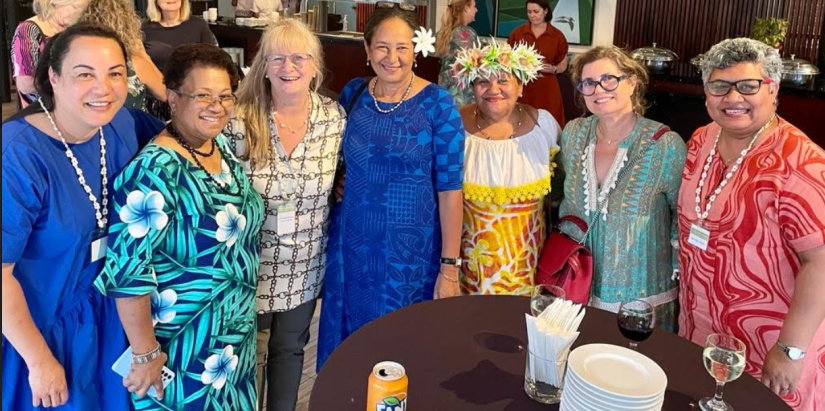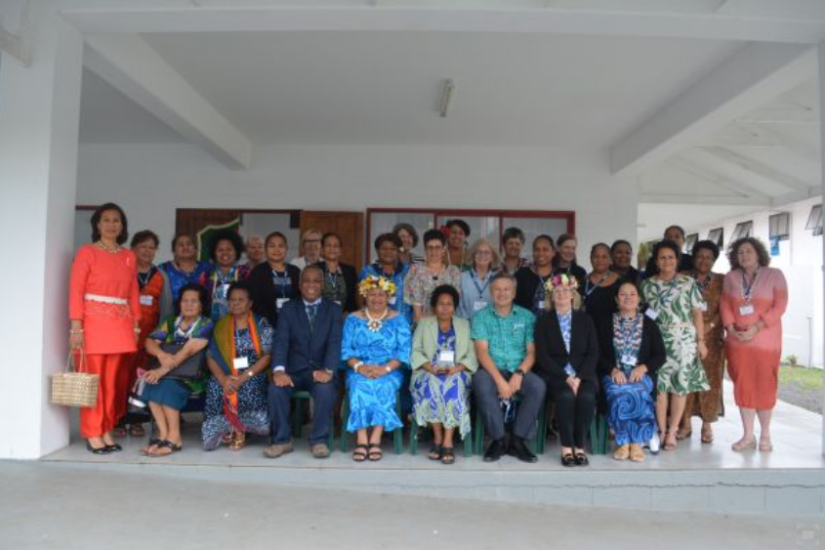Introduction
The Regional Quality Improvement Program (RQIP) is a program of work led by the World Health Organization Collaborating Centre at the University of Technology Sydney (WHOCC UTS), in collaboration with the South Pacific Chief Nursing and Midwifery Officers Alliance (SPCNMOA) and the Australian Nursing and Midwifery Accreditation Council (ANMAC) and aims to further support the regional development of consistent regulation, accreditation of education programs and nursing and midwifery accreditation and practice standards in up to 14 named Pacific Island Countries (PIC).

Lorraine Herataka, Silina Waqa, Michele Rumsey, Elizabeth Iro, Nga Manea, Anne Pinel, Colleen Wilson
Background
The program was first conceptualised at an SPCNMOA accreditation workshop in the Cook Islands in 2018 which focussed on regional accreditation issues in the Pacific region. In 2019 at a State of the Worlds Nursing meeting participants recommended to ‘progress regional partnerships and continued co-operation across undergraduate and postgraduate education, accreditation, CPD and standards development including involvement of South and North Pacific, Australia and New Zealand’. Also in 2019, at the 13th Pacific Health Ministers meeting, the Pacific Health Ministers committed to ‘identifying the health workforce indicators needed for decision making for the issues of development, shortages, retention and regulation of the health workforce across primary health care and specialised services of the Pacific’. Further, the Western Pacific Region (WPR) of WHO has identified strengthening of regulatory systems for health workers a priority action domain to achieve Universal Health Coverage (UHC). In 2021 WHO funded a scoping report on the quality of nursing and midwifery education and regulation in the PIC. Then in 2022, the WHO CC UTS secured seed funding from ANMAC to fund the RQIP in collaboration with the SPCNMOA. In 2023 a steering group of chief nurses, lead educators and regulators from member countries was set up to oversee this project.

2018 Accreditation workshop attendees in Raratonga, Cook Islands
Program Aims
The RQIP will assist PIC to strengthen their health systems and thus population health by improving nursing and midwifery education and practice. Specifically, the program aims to:
- Agree on a regional approach to regulation, including accreditation, with links to country-based systems;
- Develop both practice and accreditation standards that meet regional needs;
- Develop consistent overarching curriculum guidelines for undergraduate and post-graduate courses, all of which are accredited, which integrate the practice standards;
- Explore scope of practice for different levels of health workers;
- Develop coherent and transparent pathways that enables healthcare workers to move between the various levels of work and education e.g. nurses aid, EN, community health worker, registered nurse, midwife, clinical nurse specialist, nurse practitioner etc.;
- Review policies and guidelines on workforce mobility to considering the health needs of each country in the region and provide guidance if required.
Participating countries
Cook Islands | Niue | Tonga |
Fiji | Palau | Tokelau |
Kiribati | Papua New Guinea | Tuvalu |
Marshall Islands | Samoa | Vanuatu |
Nauru | Solomon Islands |
|
Steering committee
Membership of the Steering Committee reflects the Partnership between SPCNMOA, WHO CC UTS, the Pacific Community (SPC), WHO and ANMAC and selected individuals for their skills and knowledge in relation to regulation of health care worker education.
CNMO - Chief Nurse and Midwifery Officer, CNO – Chief Nursing Officer, DNS – Director of Nursing Services
Position | Country |
CNMO | Palau |
DNS | Solomon Islands |
CNMO | Fiji |
CNMO | Samoa |
CNMO | Cook Islands |
CNMO | Papua New Guinea |
CNO/CNMO | Tonga |
CNO/CNMO | Vanuatu |
Nursing Advisor, SPC | Fiji |
Technical Officer, WHO | Fiji |
Secretariat |
|
WHO CC UTS | Professor Michele Rumsey |
ANMAC | Mr Greg Cantwell |
WHO CC UTS | Professor Di Brown |
WHO CC UTS | Associate Professor Jenny Sim |
WHO CC UTS | Associate Professor Karen Hammad |
ANMAC | Mr Alan Merritt |

